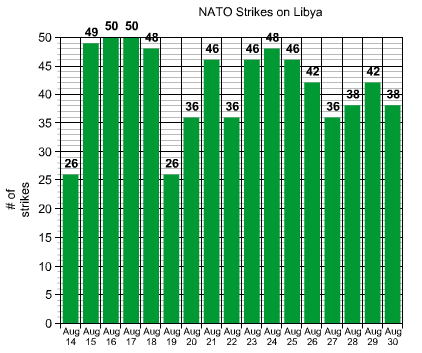
There’s been no reduction in NATO’s bombing of targets inside Libya since rebels forces stormed in and took over most of Tripoli August 21, sending Muammar Gaddafi into hiding. What’s left to attack?
NATO is glad you asked. “From an air component perspective, NATO is still very much involved in monitoring the situation and intervening with extreme care and precision when and where we identify threats against the population, including surface-to-surface missile systems, multiple-rocket launchers, air-tracking radars and anti-aircraft guns,” Colonel Roland Lavoie, the operation’s military spokesman, said Tuesday. “As recently as yesterday our aircraft struck several surface-to-air threats and multiple military vehicles in the vicinity of Sirte, which is considered as a last bastion of the Gaddafi regime.”
Bottom line: the alliance believes Gaddafi still has command of what’s left of forces loyal to him, and is determined to keep swatting at those troops and weapons — and at whatever links it can find that Gaddafi and/or his allies are using to control those forces.
Polish Prime Minister Donald Tusk has said he wants NATO to declare an end to the war at an international conference on Libya to be held in Paris on Thursday. A NATO member, Poland refused to participate in the attacks on Libya. NATO officials say the bombings will continue until military commanders tell NATO’s ruling body, the North Atlantic Council, that it’s time to stop.
While rebels continue to try to get Gaddafi’s troops to surrender, that may not be possible for those around Sitre, Gaddafi’s birthplace, some 225 miles east of Tripoli. “Despite the fall of the Gaddafi regime and the gradual return of security for many Libyans, NATO’s mission is not finished yet,” Lavoie said from NATO’s operational headquarters in Naples, Italy. “We remain fully committed to our mission and to keeping the pressure on the remnants of the Gaddafi regime until we can confidently say that the civilian population of Libya is no longer threatened.”


